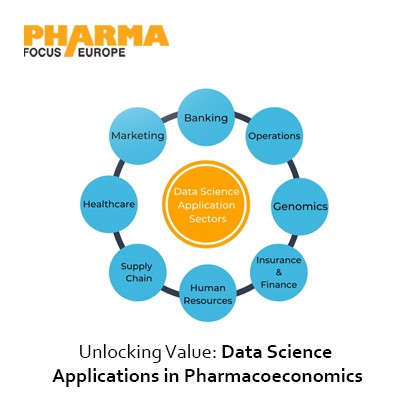
This article explores the transformative impact of data science on pharmacoeconomics, covering data-driven decision-making, real-world evidence generation, value-based pricing, personalized medicine, risk prediction, ethical considerations, and future challenges. It showcases how data-driven insights are revolutionizing healthcare economics and improving patient outcomes.

In the realm of healthcare, where every decision has significant financial implications, pharmacoeconomics plays a pivotal role. It involves the evaluation of the economic impact of pharmaceutical products and services, helping stakeholders make informed decisions regarding healthcare resource allocation. With the advent of data science technologies, pharmacoeconomics has witnessed a transformative shift, unlocking new avenues for value creation and optimization. This article delves into the intricate landscape of data science applications in pharmacoeconomics, exploring how data-driven insights are revolutionizing decision-making processes and shaping the future of healthcare economics.
1. Data-driven Decision Making
Data science empowers pharmacoeconomic analyses by leveraging vast datasets to extract actionable insights. Traditional pharmacoeconomic studies often relied on limited data samples and simplistic models, leading to incomplete assessments of cost-effectiveness and outcomes. However, with advanced analytics techniques such as machine learning and predictive modeling, researchers can now analyze complex datasets comprising real-world patient data, clinical outcomes, treatment patterns, and cost information. This data-driven approach enables more accurate and comprehensive evaluations of healthcare interventions, providing stakeholders with a clearer understanding of the economic impact and value proposition of different treatments.
2. Real-world Evidence Generation
One of the key contributions of data science to pharmacoeconomics is the generation of real-world evidence (RWE). RWE encompasses data derived from real-world patient experiences, including electronic health records (EHRs), claims data, patient registries, and observational studies. By harnessing RWE through advanced analytics, researchers can conduct comparative effectiveness analyses, evaluate treatment outcomes in diverse patient populations, assess healthcare utilization patterns, and quantify the economic burden of diseases. This real-world evidence strengthens the foundation of pharmacoeconomic evaluations, offering insights into the long-term effectiveness and cost-efficiency of healthcare interventions.
3. Value-based Pricing and Market Access
Data science plays a pivotal role in value-based pricing strategies and market access initiatives for pharmaceutical products. By analyzing real-world data on treatment outcomes, patient preferences, and economic outcomes, stakeholders can develop value-based pricing models that align product pricing with demonstrated therapeutic value. Moreover, data-driven market access strategies leverage predictive modeling to identify target patient populations, assess market demand, optimize pricing structures, and navigate reimbursement challenges. These data-driven approaches enhance market competitiveness, facilitate payer negotiations, and ensure equitable access to innovative therapies.
4. Health Economic Modeling
Health economic modeling is another area where data science applications are transforming pharmacoeconomic analyses. Traditional economic models such as cost-effectiveness analysis (CEA) and budget impact analysis (BIA) often relied on static assumptions and simplified scenarios. Data science techniques enable the development of dynamic and probabilistic models that account for real-world variability, patient heterogeneity, treatment sequencing, and long-term outcomes. These advanced models simulate complex healthcare dynamics, allowing stakeholders to assess the economic value of interventions under varying scenarios, uncertainties, and policy changes.
5. Personalized Medicine and Targeted Interventions
The era of personalized medicine is heavily influenced by data science innovations in pharmacoeconomics. By integrating genetic data, biomarkers, patient characteristics, and clinical outcomes, data-driven analyses facilitate the identification of subpopulations that are most likely to benefit from specific treatments. This personalized approach to healthcare optimization enhances treatment efficacy, reduces healthcare costs associated with ineffective therapies, and improves patient outcomes. Data science-driven pharmacoeconomic assessments enable the prioritization of targeted interventions that deliver optimal value and patient-centered care.
6. Risk Prediction and Management
Data science algorithms excel in risk prediction and management, a critical aspect of pharmacoeconomics. By analyzing historical data, clinical parameters, and predictive variables, machine learning models can forecast patient risks, disease progression, treatment response, and adverse events. These risk prediction models inform pharmacoeconomic evaluations by quantifying the potential economic consequences of different risk scenarios, guiding resource allocation strategies, and optimizing risk mitigation measures. Data-driven risk management enhances decision-making precision, improves patient safety, and minimizes economic uncertainties in healthcare settings.
7. Ethical Considerations and Data Privacy
While data science offers tremendous potential in pharmacoeconomics, it also raises ethical considerations related to data privacy, security, and transparency. As researchers access and analyze sensitive patient information, ensuring data anonymization, compliance with regulatory standards (such as GDPR and HIPAA), and ethical use of data becomes paramount. Stakeholders must prioritize data governance frameworks, transparency in data sourcing and analysis methodologies, and informed consent practices to uphold patient privacy rights and maintain public trust in data-driven healthcare decision-making.
8. Future Directions and Challenges
Looking ahead, the future of data science in pharmacoeconomics holds immense promise and several challenges. Advancements in artificial intelligence, big data analytics, natural language processing, and blockchain technologies will further enhance the depth and accuracy of pharmacoeconomic analyses. However, challenges such as data quality issues, interoperability barriers, algorithm bias, regulatory complexities, and the need for interdisciplinary collaboration remain significant hurdles. Addressing these challenges requires concerted efforts from healthcare stakeholders, policymakers, data scientists, and ethicists to harness the full potential of data science in optimizing pharmacoeconomic outcomes and improving patient-centric care delivery.
In conclusion, data science applications in pharmacoeconomics are reshaping the landscape of healthcare economics, offering unprecedented opportunities for value creation, evidence-based decision-making, and personalized healthcare interventions. By harnessing the power of data-driven insights, stakeholders can navigate complex healthcare challenges, optimize resource allocation, enhance market access strategies, and ultimately improve patient outcomes while ensuring ethical data practices and privacy safeguards. As we continue to unlock the value of data science in pharmacoeconomics, collaboration, innovation, and ethical stewardship will be key drivers of transformative change in healthcare economics and patient care.